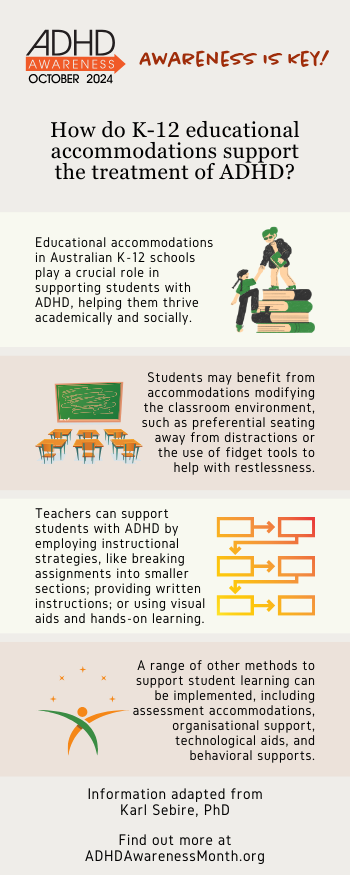Educational accommodations in Australian K-12 schools are essential for supporting students with ADHD, ensuring they thrive academically and socially. With targeted strategies and professional training for teachers, these provisions create inclusive environments where all students can succeed.
Note: The K-12 accommodations in Australia are similar to those used in the U.S. and other countries.

Educational accommodations play a crucial role in supporting students with ADHD in K-12 settings, complementing other forms of treatment and helping these students succeed academically and socially. In Australia, these accommodations are systematically documented through the Nationally Consistent Collection of Data on School Students with Disability (NCCD), an annual process that collects information about students receiving adjustments due to disability.
Classroom Environment
Accommodations often start with modifying the physical classroom environment. Students with ADHD may benefit from preferential seating away from distractions or using fidget tools to help with restlessness.
Instructional Strategies
Teachers can employ various instructional strategies to support students with ADHD:
- Breaking assignments into smaller, manageable sections
- Providing written instructions for assignments
- Using visual aids and hands-on learning activities
A range of other methods can be implemented to support student learning, including:
- Assessment Accommodations: Common assessment accommodations include extended time for tests and assignments, taking tests in a separate room, or allowing alternative test formats.
- Organisational Support: Many students with ADHD struggle with organisation. Accommodations may include using colour-coded folders for diQerent subjects or assigning a peer buddy to help with transitions.
- Technology Aids: Assistive technology can be beneficial, such as note-taking software or access to digital textbooks.
Behavioral Supports
Accommodations may also address behavioural challenges through behavior management plans and positive reinforcement strategies. These accommodations, typically formalised through an Individualised Education Program (IEP) or similar plan, work alongside other ADHD treatments. The NCCD process ensures that schools review their support systems regularly, improving education outcomes for all students. By documenting these adjustments, the NCCD helps schools, education authorities, and governments better understand and support the needs of students with disability, including those with ADHD
About the Author

Dr Karl Sebire is a researcher, speaker, and sessional academic at the University of Melbourne. He consults to a range of organisations who have an increasing appetite to understand technology’s role in the attention economy. A leading expert in digital distraction, attention spans and technology dependence, Karl manages the challenges of neurodiversity in the classroom, both for learners with ADHD, and their teachers.
